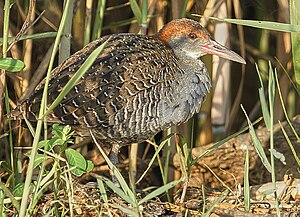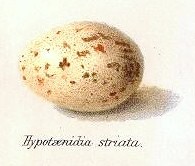Greyish bones
| Grauburstralle | ||||||||||
|---|---|---|---|---|---|---|---|---|---|---|

Grauburstralle |
||||||||||
| Systematics | ||||||||||
|
||||||||||
| Scientific name | ||||||||||
| Gallirallus striatus | ||||||||||
| ( Linnaeus , 1766) |
The Graubrustralle ( Gallirallus striatus ) is a 25 centimeter tall representative of the railing family .
Appearance
This species has a white throat, the otherwise grayish head is reddish on top. The eyes are red. The chest is covered with gray feathers. The belly and the back are covered with brown feathers provided with regularly arranged thin white lines. The feathers get a little darker towards the short tail. The thin legs with three long toes are black. The thin, long beak is black on top and the lower half is reddish.
distribution and habitat
This species is found in India and Southeast Asia , the Great Sunda Islands , Sulawesi, and the Philippines . The gray-breasted rush rail inhabits the swamps , rice fields and thickets of mangroves .
Way of life
The Graubrustalle spends the day sleeping in the thick vegetation. At dusk and at night , she looks for insects , spiders and mollusks . But she also eats fresh plants and seeds. These animals are very good swimmers. In the event of danger, they immediately dive under water.
Reproduction
The nesting is done by the breeding pair together. The nest consists of dry and fresh plant parts and is hidden in the reeds or in a tuft of trees . The female lays 4–6 spotted eggs in the nest. Both partners take over the breeding business. The young hatch after 20 days. The chicks leave the nest immediately after hatching. The parents provide the young with food.
Danger
Because of its wide distribution and because no endangerments are known for this species, the IUCN classifies this species as Least Concern .
Scientific names
Further scientific names for this species are or were: Lewinia striata , Rallus striatus .
literature
- Wildlife of Asia in color. Karl Müller Verlag, Erlangen 1989, p. 207.
Web links
- Lewinia striata inthe IUCN Red List of Threatened Species 2020.1. Listed by: BirdLife International, 2016. Retrieved June 8, 2020.

